Index relies entirely on the support of donors and readers to do its work.
Help us keep amplifying censored voices today.
[vc_row][vc_column][vc_column_text]This article is part of Index on Censorship partner Global Journalist’s Project Exile series, which has published interviews with exiled journalists from around the world.[/vc_column_text][vc_column_text]
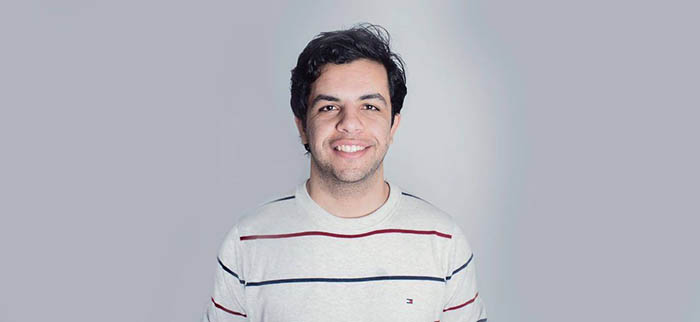
Egyptian journalist Abdullah Elshamy
“I face probably a life sentence or maybe even worse. The idea of not being able to go back to your own country…is just heartbreaking.”
For a time, journalist Abdullah Elshamy was the face of resistance in Egypt.
After then-army chief Gen. Abdel Fatah el-Sissi led a coup, in July 2013, toppling the democratically-elected president Mohammed Morsi, major street protests against the military took place in Cairo.
Elshamy, who is originally from Beheira in the Nile Delta, was a correspondent working for Al Jazeera at the time. He had only recently returned to Egypt from an assignment in Nigeria to cover the unrest.
On Aug. 14 of that year, Elshamy was covering a sit-in near the Rabaa al-Adawiya mosque when security forces began to open fire. More than 800 people were left dead at Rabaa and one other protest site in Cairo in what Human Rights Watch has called the “world’s largest killings of demonstrators in a single day in recent history.”
Elshamy managed to avoid the bullets, but he and hundreds of others were arrested as crowds fled the area around the mosque. Elshamy was taken to prison and held without trial for months.
Losing hope, in January 2014 Elshamy decided to begin a hunger strike. Over the next several months, he would lose about 88 pounds (40 kg). His case garnered international headlines, especially after he managed to record a dire video from inside jail on the 106th day of his hunger strike and have it smuggled out. “If anything happens to my safety, I hold the Egyptian regime with the responsibility of that,” he said on the video.
Update: In September 2018 am Egyptian court sentenced Abdullah Elshamy in absentia to 15 years in prison.
Efforts by prison authorities to force-feed him and punish him by placing him in solitary confinement failed. In June 2014 Egyptian prosecutors decided to release him because of his declining health. Elshamy was met outside the prison by a throng of family members, supporters and the press.
“I have won,” he told the cameras. “And everybody who is a freedom fighter, either a journalist or anyone doing his work credibly and with honesty has won. This experience has changed my life.”
Elshamy soon moved to Qatar and resumed work for the Qatari-owned al-Jazeera, which Egyptian prosecutors brought charges against him in absentia, as well as against hundreds of others imprisoned after the 2013 demonstrations. A verdict in the trial is expected in the coming months.
Meanwhile, press freedom in Egypt has not improved under el-Sissi, who has been president since 2014. More than 35 journalists and bloggers are in prison in the country, according to Reporters Without Borders.
Now 29, Elshamy lives in Doha and hosts the monthly investigative show “Eyewitness” for Al Jazeera’s Arabic channel. Nearly four years after his release, Elshamy spoke with Global Journalist’s Taylor Campbell about his ordeal and the consequences of exile. Below, an edited version of their interview:
Global Journalist: What happened in the lead-up to your arrest?
Elshamy: Back in 2013 I was working as a reporter for al-Jazeera when the events started taking place in Egypt, the tensions between the president [Morsi] and the army. Just a few days before the military coup took place in Egypt on the 3rd of July 2013, I was asked by management to go from Nigeria where I was stationed, to Cairo, to be able to cover events.
I never had in my wildest dreams [thought] things would end up like that. I mean, I covered more serious and dangerous things. Before this I was in Libya during the [civil] war back in 2011 and I was also in Mali when the [2013] French intervention happened in the north of the country. So it was for me, probably just another round of demonstrations and things would cool down eventually and the politics would work out.
So I went there and I covered the events from both sides. Things went on for several weeks [after the coup] until the army and the police moved in on the demonstrations on the eastern side of Cairo.
On the 14th of August 2013, the army and the police were detaining everyone coming out of [the Rabaa al-Adawiya] area. I was among those arrested.
And from that point, from the 14th of August 2013 until the 18th of June 2014, I was put in detention without trial.
GJ: How did being a journalist affect your time in prison?
Elshamy: At the beginning, they didn’t know I was a journalist because I tried not to mention that. I feared there might be a severe response if they found out.
When the authorities [learned] I was a journalist it didn’t actually change much. It made them put more restrictions on my time in prison. They monitored the letters I got and the visits from my family. But at they put me among the demonstrators that were arrested on that day. They insisted I was a criminal, not a journalist.
There were I would say, focused attacks on me because when they found out I was a journalist at al-Jazeera, relations between Egypt and Qatar were not the best. I was harassed by the guards because they thought of me as a spy.
Nothing made sense at that point…I was not the only journalist in prison. One of my colleagues [Mahmoud Abu Zeid, better known as Shawkan], is a freelance photojournalist who was detained on the same day with me, and up until this day he is in prison.
Shawkan is a freelance photojournalist detained in Egypt since 14 August 2013, he was my cell mate and he doesn’t deserve death as the prosecution demanded. #MyPicForShawkan pic.twitter.com/PK9SvSpeRJ
— Abdullah Elshamy (@abdallahelshamy) 10 April 2018
GJ: Tell us about the hunger strike and how it led to your release.
Elshamy: The last week of January 2014 I decided I was going on a hunger strike, because I was in prison at that point for five months and nothing was happening in terms of my release. My lawyers gave several documents to prove I was [at the protest] doing my work. They’d requested I be released on bail.
When I decided that I was going on hunger strike, the prison authorities at the beginning…they made fun of the whole thing. But then when it was March and I was losing weight and my health was not the best, the Ministry of Interior thought that they would start to intimidate me into giving up on the whole thing.
It eventually came to the point where the prison’s manager, an assistant of the minister himself, came to see me and said: “This is not good. What are you doing? You are young, your health isn’t going to take it.”
Eventually, when they found out that I wasn’t giving up on the hunger strike, I was sent to a maximum security prison for the next five weeks before my release.
That was the hardest part of the whole prison experience because I only saw my family once in those five weeks. I was kept in a solitary confinement cell. I wasn’t allowed to see anyone. Even when I was given time to walk out of my cell, it was at the end of the day while all the other inmates in the ward were not present. It was psychological pressure. They thought maybe this would break me down.
GJ: How is life for you now?
Elshamy: Although I was released four years ago, I’m still being tried in absentia. I cannot go back to Egypt. I risk being arrested and it’s kind of a dead end for me at this point. As the trial approaches its end, I face probably a life sentence or maybe even worse. The idea of not being able to go back to your own country is just heartbreaking.[/vc_column_text][/vc_column][/vc_row][vc_row][vc_column width=”1/2″][vc_video link=”https://youtu.be/tOxGaGKy6fo”][/vc_column][vc_column width=”1/2″][vc_column_text]Index on Censorship partner Global Journalist is a website that features global press freedom and international news stories as well as a weekly radio program that airs on KBIA, mid-Missouri’s NPR affiliate, and partner stations in six other states. The website and radio show are produced jointly by professional staff and student journalists at the University of Missouri’s School of Journalism, the oldest school of journalism in the United States. [/vc_column_text][/vc_column][/vc_row][vc_row][vc_column][vc_custom_heading text=”Don’t lose your voice. Stay informed.” use_theme_fonts=”yes”][vc_separator color=”black”][vc_row_inner][vc_column_inner width=”1/2″][vc_column_text]Index on Censorship is a nonprofit that campaigns for and defends free expression worldwide. We publish work by censored writers and artists, promote debate, and monitor threats to free speech. We believe that everyone should be free to express themselves without fear of harm or persecution – no matter what their views.
Join our mailing list (or follow us on Twitter or Facebook). We’ll send you our weekly newsletter, our monthly events update and periodic updates about our activities defending free speech. We won’t share, sell or transfer your personal information to anyone outside Index.[/vc_column_text][/vc_column_inner][vc_column_inner width=”1/2″][gravityform id=”20″ title=”false” description=”false” ajax=”false”][/vc_column_inner][/vc_row_inner][vc_separator color=”black”][/vc_column][/vc_row][vc_row][vc_column][vc_basic_grid post_type=”post” max_items=”6″ style=”load-more” items_per_page=”2″ element_width=”12″ grid_id=”vc_gid:1542640554551-b7c870c1-3f87-6″ taxonomies=”22142″][/vc_column][/vc_row]
Louisa Lim: To write my book The People’s Republic of Amnesia: Tiananmen Revisited, I spent a lot of time in fast-food restaurants. Not because I like burgers, but because dissidents often favour the crush of diners and the buzz of conversation, believing it complicates surveillance. As I sat in McDonald’s with Bao Tong – who spent seven years in jail as the highest government official to be sentenced post-Tiananmen – he could point out which plainclothes policemen were shadowing him. Read in full.
[vc_row][vc_column][vc_column_text]
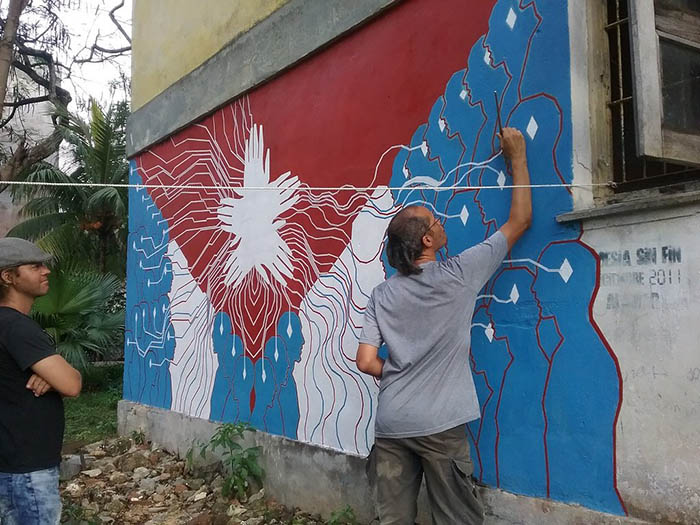
Cuban artist Yasser Castellanos
Despite official efforts to stop it in its tracks, Cuba saw the successful completion of its first independent art biennial, organised without the support of the state, on 15 May. Artist Luis Manuel Otero Alcantara and curator Yanelys Nuñez Leyva, members of the Museum of Dissidence, winner of the 2018 Index on Censorship Freedom of Expression Award for art, organised the ten-day #00Bienal de la Habana, which included over 170 artists, writers, musicians and theorists across nine different exhibitions in artists’ homes and studios around the country’s capital.
“Cuban culture is centralised culture and the government has absolute control,” Nuñez Leyva tells Index on Censorship. “The Ministry of Culture, together with all its branches such as the Union of Writers and Artists of Cuba and the National Council of Plastic Arts, are tentacles of the Ministry of the Interior, so all independent proposals, whether cultural, ecological or campaigns against gender violence, for example, are cursed with all the might of the government-controlled media.”
Even at schools pupils are served up propaganda intent on turning them against non-state-approved artists. Some art school students were shown a video portraying Otero Alcantara as a mercenary. “Such a campaign inevitably generates fear around independent projects which then suffer due to lack of both social and economic support,” Nuñez Leyva says.
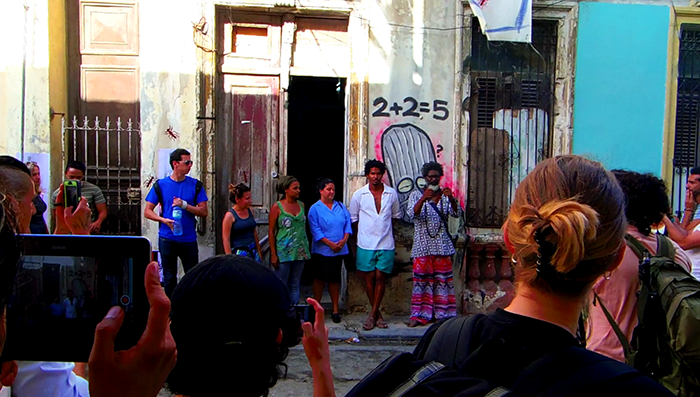
Economic support was one of the biggest obstacles for #00Bienal. “At the beginning, we thought that we would produce it with what we had at hand, but along the way we realised that we needed more,” Nuñez Leyva says. So a Gofundme campaign was set up, which raised $6,574. “But this wasn’t easy: the impact of the US blockade, our isolation from the world of networks and the impossibility of having credit cards made the process anguishing.”
Otero Alcantara was also imprisoned without cause on several occasions as part of the Cuban government’s campaign of harassment. Others who took part in #00Bienal, whether Cuban or foreign, received similar harassment. Many were even denied entry to the country, including the Cuban-American artist Coco Fusco.
When #00Biennial was announced in September 2017, the Cuban government immediately began to show its discontent through its cultural institutions. In an official declaration they branded the organisers as “unscrupulous people”. In response, #00Bienal’s first slogan was: “From the official to the unscrupulous.”
As culture is so tightly controlled in Cuba, only artists seen to be working in the interests of the regime can operate without restriction. Approved artists usually receive perks, something that gives them a higher status in society. Some artists risked all of this by taking part in #00Bienal. “The system used the worst blackmail against them because they gave the event a legitimacy that the government did not want,” Otero Alcantara says. “These artists were threatened by having their government accreditation taken away. Without this, they would find themselves without ‘official work’.”
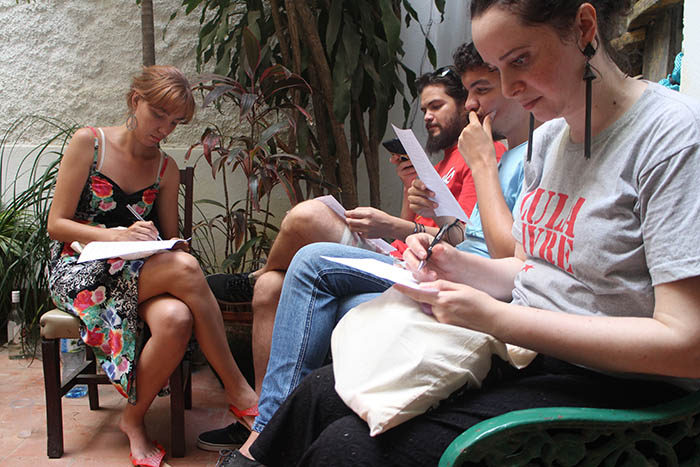
Government agents stalked the exhibitions while the organisers were accused of being in league with Cuba’s enemies. How does one respond to such accusations? “We responded by making an event that is as honest as possible, with a wide range of manifestations and artistic expressions that reflected the reality of Cuban art,” Nuñez Leyva says. “We responded with a list of more than 170 participants, not only Cubans, but from Mexico, Spain, Germany, the United States, Romania, Angola, Colombia, Denmark, Ukraine, Brazil, Venezuela, among them high-profile artists that Cuban institutions admire and collaborated with.”
The authorities even tried to prohibit the public from attending, sometimes successfully. Flyers and stickers were also confiscated. “But none of these actions were ever going to stop the energy of the event,” Otero Alcantara says.
“Despite all this pressure, the event went ahead, demonstrating that there is a group of people who are very courageous and have a real commitment culture,” Nuñez Leyva says. #00Bienal helped revive “a spirit of alternative rebellion” through the involvement of “countless numbers of totally unknown artists” that the state would never endorse.
For Otero Alcantara, the event’s success lies in the cohesion it created between artists, scholars and art enthusiasts, something that is unprecedented in the world of Cuban art. “We built an inclusive space of free creation and true collaboration between the people involved, exhibited the work of artists who were never going to have space in an official Havana Biennial and set a precedent for future projects,” he says. “This is one more step towards eliminating a fear that exists throughout Cuba.”
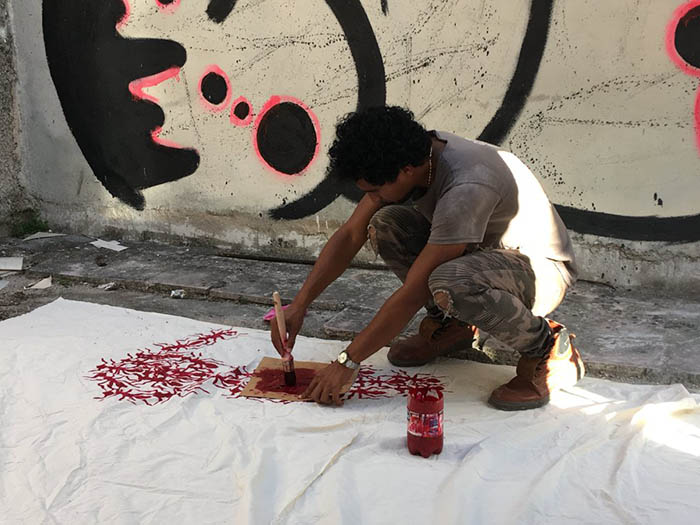
According to the organisers, the terms “revolution” or “revolutionary” have been hijacked and distorted by the Cuban regime. Such deformation has taken root so deep in the imagination of the Cuban people that just by mentioning the word “dissidence” is enough to be shunned, they explain.
“The #00Bienal was a humanistic project that brought to the fore essential values for any society such as unity, solidarity and collaboration,” Nuñez Leyva says. “The event also favoured the less privileged and created beauty and dialogue in favour of a new Cuba.”
The organisers of #00Bienal are under no illusions that life for Cuba’a dissident artists will magically become any easier under Cuba’s new president, Miguel Díaz‑Canel, who took over from Raúl Castro in April 2018. “The Cuban regime is more than any Castro,” Nuñez Leyva says. “It is a system based on a group of families that live both inside and outside the island, who have control over everything, which ultimately contributes to their own wealth.” This corrupt system relies on the deception of a people who have been left without even the strength even to protect themselves against poverty, she adds. “This situation leaves us with little hope, but we have to keep working.”
Otero Alcantara and Nuñez Leyva’s now want to show that #00Bienal wasn’t just a one-off, but is a serious project with longevity. “We will see if it is possible in two years to achieve something similar,” Otero Alcantara says.[/vc_column_text][/vc_column][/vc_row][vc_row][vc_column][vc_media_grid grid_id=”vc_gid:1528443291288-dfd45bff-0a16-7″ include=”100716,100712,100711,100710,100713,100709,100708,100707,100706,100704,100715,100705″][/vc_column][/vc_row][vc_row][vc_column][vc_column_text]
Amaury Pacheco (Cuba), Iris Ruiz (Cuba), Coco Fusco (Cuba-USA), Tania Bruguera (Cuba), Reynier Leyva Novo (Cuba), Ernesto Oroza (Cuba), Gerardo Mosquera (Cuba), Katherine Bisquet (Cuba), Jose Ernesto Alonso, Yuri Obregón (Cuba), Alein Somonte (Cuba), Alejandro Barreras (Cuba), Anaeli Ibarra (Cuba), Alejandro Taquechel (Cuba), Ariel Maceo Tellez (Cuba), Aryam (Cuba), Aldeide Delgado (Cuba), Armando Cuspinera (Mexico), Antonio Mas (Spain), Alicia Torres (Spain), Ana Olema (Cuba), Alexis Ruiseco (Cuba-USA), Alexandru Raevschi (Germany), Andrés X (Cuba), Alain Aspiolea (Cuba), Alexandre Arrechea (Cuba), Antoni Muntadas (Spain), Biennial Project (USA), Boris González Arenas (Cuba), Colectivo Corason i uevo (Antonio A. Orta, Maykel Almenteros y Pedro Pablo Bacallao) (Cuba), Colectivo Guerrillas Girls, Celia y Yunior (Cuba), Colectivo 2.50 (Ana Gómez, Argelia Leodegarío, Marco Antonio Rodríguez, Itandehuitl Orta, Yuvia Pérez, Esmeralda Pérez) (Mexico), Carlos Manuel Álvarez (Cuba), Clara Astiasarán, Chu (Cuba), David de Omni, David León (Cuba), Danilo Maldonado (El Sexto), Diego Gil (Spain), Eliecer Jiménez Almeida (Cuba), Erish (Mexico), El Oficio (Cuba), Ernesto Hernandez Busto, Enfori García, Filipa César (Portugal), Fabián (2+2 =5) (Cuba), Francis Sánchez (Cuba), Francisco Méndez (Mexico), Francisco Masó (Cuba), Fabian Martínez, Filio Gálvez, Fredric Snitzer, Gabriel Coto (Cuba), Gerardo Stübing (España), Gean Moreno, Henri Eric Hernández (Cuba), Hamlet Lavastida (Cuba), Héctor Trujillo (Cuba), Hugo Patao, Italo Expósito (Cuba), Iván de la Nuez (Cuba), Jesús Hdez-Güero (Cuba), Jesús Benítez (Mexico), José Luis Marrero (Cuba), Josvan Gonzalez Agramonte (Cuba), Julián Yunda Yepes (Mexico), Jenifer Acuña (Cuba), Juan Melo (Colombia), Juan Carlos Alvarez Miranda (Cuba), Jean-Lorin Sterian (Romania), José Bedia (Cuba), Julio César Llopiz (Cuba), Javier Marimón, José Manuel Mesías (Cuba), Keyezua (Angola), Kevin Arrow, Lía Villares (Cuba), Luis Trápaga (Cuba), Luiso, Leandro Villanueva (Sam 33) (Cuba), Lester Dubé (Cuba), Lala Misosniky (Romania), La Alianza (Cuba), Liliam Dooley, Leandro Feal (Cuba), Lourdes Porrata, Miquel García (Spain), Marisol Maza (Mexico), Marcel Marquez (Cuba), Marianna Liosi (Germany), MO colectivo (Mariam Abrajim y Octavio Salazar) (Colombia), Magdiel Aspillaga, Mysora García, Nonardo Perea (Cuba), Natalia López (Colombia), Osmel Almaguer Delgado (Cuba), Osmany Carratalá (Cuba), Oscar Salamanca (Colombia), Orlando Hernández (Cuba), Pablo Pinto (Colombia), Polyanna Morgana (Brazil), Political Architecture: Critical Sustainability (PA:CS) (Denmark), Peter Menéndez, Rafael Carabano (Venezuela), Raúl Meriño (Cuba), Ras Yoe, Ricardo Figueredo, Rodolfo Peraza (Cuba), Rafael Domenech, Rirkrit Tiravanija, Svitlana Biedarieva (Ukraine), Soandry del Río (Cuba), Sandra Ceballos (Cuba), Santiago Alvarez Méndez (Colombia), Sandor (Cuba), Thiago Morandi (Brazil), Tomás Sánchez (Cuba), Tomas Vu, Tonel (Cuba), unx Pardo Ibarra (Colombia), Ulises Valdés (Mexico), Walfrido Valera (Cuba), Yaima Pardo (Cuba), Yasser Castellanos (Cuba), Yesica Suárez (Colombia), Yulier P. (Cuba), Yoenis Eloy Mayeta (Cuba), Yimi Konclase (Cuba), Yvelin Buenrostro (Mexico), Yucef Merhi (Venezuela), Yornel Martínez (Cuba), Yali Romagoza (Cuba), Yanier H. Palao (Cuba).[/vc_column_text][/vc_column][/vc_row][vc_row][vc_column][vc_basic_grid post_type=”post” max_items=”4″ element_width=”6″ grid_id=”vc_gid:1528443291296-0ad2c295-a239-7″ taxonomies=”104″][/vc_column][/vc_row]
[vc_row][vc_column][vc_single_image image=”100169″ img_size=”full”][vc_column_text]Media freedom in the United States of America has been under threat for several years, and the findings from an unprecedented mission to the US by leading human rights and media freedom organisations working on freedom of expression, reveals the true extent of the decline.
Over the last two decades, the situation has become steadily worse. Growing numbers of prosecutions against whistleblowers and journalists’ sources, attacks against and arrests of reporters covering protests, sweeping national security justifications to restrict public access to information, and border checks of journalists’ equipment, and an increasingly precarious economic situation for many news outlets, are among the pressing concerns that media workers relayed to the media freedom mission.
In our ever-shrinking globalised world, domestic policy is felt as keenly abroad as at home. That is why the impact of the decline in the US affects all of us. Our freedom to know, to criticise and to question those who hold power over us is reliant on the free flow of pluralistic and independent information.
How do we protect those freedoms?[/vc_column_text][/vc_column][/vc_row][vc_row][vc_column][vc_custom_heading text=”Speakers” use_theme_fonts=”yes”][vc_row_inner][vc_column_inner width=”1/3″][vc_single_image image=”100677″ img_size=”full” add_caption=”yes”][/vc_column_inner][vc_column_inner width=”1/3″][vc_single_image image=”100678″ img_size=”full” add_caption=”yes”][/vc_column_inner][vc_column_inner width=”1/3″][vc_single_image image=”80210″ img_size=”full” add_caption=”yes”][/vc_column_inner][/vc_row_inner][/vc_column][/vc_row][vc_row][vc_column][vc_column_text]
[/vc_column_text][/vc_column][/vc_row]